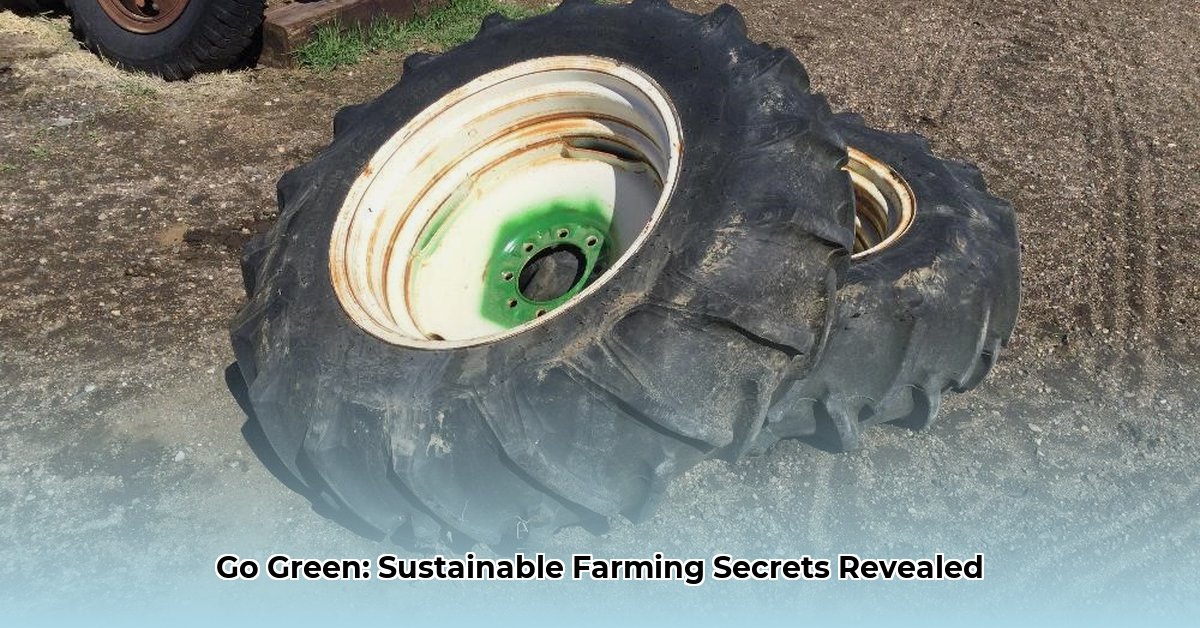
13.6-26 Tractor Tires: A Key Component of Sustainable Agriculture
13.6-26 tractor tires, often overlooked, play a surprisingly significant role in the sustainability of farming operations. Their impact extends beyond simple traction, influencing fuel efficiency, soil health, and overall farm profitability. Optimizing their use is a crucial step toward environmentally responsible agriculture. How can we ensure we're making the most of this often-overlooked aspect of sustainable farming? For more information on tire pressure, check out this helpful resource on tire pressure.
The Environmental Impact of 13.6-26 Tractor Tires
These tires directly affect several key sustainability metrics. Improper inflation and tire wear lead to increased fuel consumption and greenhouse gas emissions. Excessive soil compaction, caused by improper tire selection or inflation, reduces crop yields and soil health. Choosing the right tires, therefore, is a significant step toward more responsible farming practices. How much fuel savings can be realized by maximizing tire life?
Extending Tire Lifespan: Saving Money and the Planet
Several key practices directly impact tire longevity and, consequently, environmental impact.
Maintaining Proper Inflation: Consistent tire pressure monitoring is critical. Underinflation increases wear and fuel consumption; overinflation risks damage. Regular checks, ideally weekly, are essential. What is the typical percentage increase in fuel consumption with underinflated tires?
Investing in High-Quality Tires: While the upfront cost might be higher, premium tires often offer superior durability and a longer lifespan, reducing waste and replacement needs over time. What is the average lifespan increase for high-quality 13.6-26 tires compared to standard options?
Implementing Regular Maintenance: Regular inspections for cuts, bulges, and uneven wear are crucial for preventing costly repairs or premature replacements. Early detection and maintenance significantly extend tire life and reduce environmental impact. How often should a farmer inspect 13.6-26 tractor tires for damage?
Minimizing Soil Compaction and Maximizing Fuel Efficiency
Soil compaction, a significant issue in agriculture, is directly influenced by tractor tire selection and management. Heavy tires or underinflation can significantly compact soil, reducing water infiltration and root growth. This leads to decreased yields and increased reliance on fertilizers and other inputs. What percentage reduction in soil compaction can be achieved with proper tire inflation and selection?
Proper tire inflation is key to minimizing soil compaction. Furthermore, choosing tires with larger footprint areas distributes the tractor's weight more evenly, further reducing soil pressure. These practices not only improve soil health but also lead to better fuel economy – less slippage means less fuel burned, translating directly to lower emissions. How does optimized tire pressure correlate to fuel efficiency improvements?
"Proper tire pressure and tire selection are absolutely crucial for minimizing soil compaction," says Dr. Emily Carter, Soil Scientist at the University of California, Davis. "Reduced compaction translates to healthier soils, improved water infiltration, and ultimately, higher crop yields."
The Future of Sustainable 13.6-26 Tractor Tires
Research and development are focused on creating more sustainable tires. Innovations include bio-based rubber alternatives and greater use of recycled materials in tire construction. These advancements promise to reduce the environmental impact of tire production and disposal. What percentage of tire components are currently being recycled in the agricultural sector?
Tire recycling programs are also gaining traction, turning waste into valuable resources. This circular economy approach represents a significant step towards reducing landfill waste associated with end-of-life tires. What are the prominent methods regarding the recycling of used agricultural tires?
Actionable Steps for Sustainable Tire Management
Implementing sustainable tire management practices is straightforward and offers significant benefits for both the environment and farm economics.
1. Implement Regular Inspections (Weekly): Check tire pressure and condition for cuts, wear, or bulges. 2. Maintain Proper Inflation: Adhere to the manufacturer's recommended inflation pressures. 3. Invest in High-Quality Tires: Higher initial cost often translates to longer lifespan and reduced replacements. 4. Support Sustainable Tire Manufacturers: Prioritize companies committed to sustainable production and materials. 5. Advocate for Change: Support initiatives promoting sustainable tire development and recycling.
By adopting these practices, farmers can significantly reduce their environmental impact and ensure long-term success. It's a small investment that yields significant returns – a healthier environment and a more prosperous business.